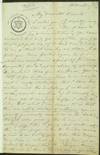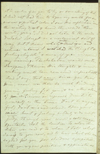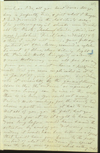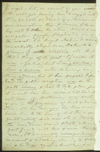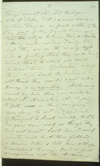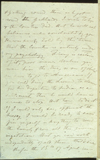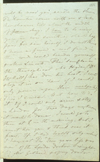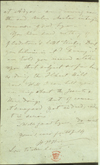Mahatma Letter No. 141
| Quick Facts | |
|---|---|
| People involved | |
| Written by: | H. P. Blavatsky |
| Received by: | A. P. Sinnett |
| Sent via: | unknown |
| Dates | |
| Written on: | unknown |
| Received on: | after March 17, 1886 – see below |
| Other dates: | unknown |
| Places | |
| Sent from: | Würzburg |
| Received at: | London |
| Via: | unknown |
This is Letter No. 141 in The Mahatma Letters to A. P. Sinnett, 4th chronological edition. It corresponds to Letter No. 139 in Barker numbering. See below for Context and background.
< Prev letter chrono
Next letter chrono >
< Prev letter Barker
Next letter Barker >
Page 1 transcription, image, and notes
|
Wednesday. My dear Mr. Sinnett, I asked you (I myself) in my letter to you "Do, please do TRY and have intuition." You have succeeded but only for one portion. You felt that a page, or so, of it had been dictated to me, and that it was by no sham K.H. But you have failed again to feel in what an unalloyed spirit of kindness sympathy for and appreciation of yourself He dictated those few sentences. You mistook it for criticism. Now, hear me. Except a vague recollection that I have been writing under His dictation, I could not, of course, remember one line of it correctly, though I have read it carefully before I closed the letter. But what I can swear to is that there was not a shadow of criticism against yourself personally meant or in the Mahatma's thought when passing this to me. I was writing my letter to you and had written about three or four pages when the Countess came in and read to me out of your letter those desponding lines in which you said that you are inclined to suspect that the "Higher Powers" do not wish the Society to live any longer and that |
|
NOTES: |
Page 2
|
it is useless for you to try or something of that. I had not had time to open my mouth for an answer and protest when I saw His reflection over the writing desk and heard the words "Now write, pray." I did not listen to the words dictated except in a mechanical sort of way, but I know with what attention and intense interest I watched the "thought and feeling-lights" and aura, if you understand my meaning. The Mahatma wanted me to, I suppose; otherwise His thoughts and inner working would have remained impenetrable. And I say, that never, since you know Him, never was there so much kindness, genuine feeling for you, and an utter absence of "criticism" or reproach directed to yourself as this time. Don't be ungrateful; don't misunderstand. Open your inner heart and feeling entirely and do not judge through your world and cold reason spectacles. Ask the Countess to whom the letter was read and to whom I told what I say to you now, and to hear which she was so glad for you, for she does sympathise with you and your position and appreciates as |
NOTES: |
Page 3
|
much as I do, all you have done. All you say is perfectly true, and just what I thought I had discerned in the Mahatma's aura. The yellow-grayish streaks were directed all to Olcott, (London period, not now), Mohini, Finch (more reddish); and to others I will not name. Your full size portrait, or scin-laeca, received a whole torrent of blue, clear silvery light — the Prince's Hall, Kingsford incident, and even Holloway were all far, far away from you in a mist — hence a proof undeniable that you were implicated in it by no fault of yours personally, but drawn into it irresistibly by the general Karma. Where is then the "criticism" or reproach? No man living can do more in this world than is in him. You could not avoid — Prince's Hall meeting, for the Society had chosen a path, in which it had to come. But all of you, you the first, had you prepared for it as it ought to have been done long before would have saved the situation by each of you delivering — even reading it would have been better — a speech that would have gone home to the public instead of what it has done. Your speech was the only one against which nothing could |
NOTES:
|
Page 4
|
be urged — but, on account of your ill-will, you having been dragged into it — so cold, so devoid of enthusiasm or even earnestness that it became like a key-note to the others. Olcott's was a regular Yankee flapdoodle one of the worst. The "Angel-Mohini's was a remarkably stupid one, Babu-like flowers of rhetoric etc. But that's things of the past. Of course it was a failure; but it might have been a success notwithstanding everything adverse, had it been prepared beforehand. The public reception was on the path chosen and had to take place, for it would have been worse still had it not come off. Holloway was sent, and was in the programme of trials and destruction. She has done you ten times more harm than to the Society but this is your fault entirely and now she is dancing the war-dance around Olcott, who is as fast friends with her and more than you were. It is a weekly correspondence incessant and endearing, charming to behold she is his dear agent in Brooklyn, for |
NOTES:
|
Page 5
|
things occult etc. Let that go. — About "chelas" — it is a more serious question. They are no fools either of them. They feel, if they do not know yet, that the abyss between them and Masters is being made wider daily. They feel they are on the wrong left side, and feeling that, they will turn towards that, to which all such "failures" turn. If Masters ordered them to go back to India I do not think they would now under Bowajee's inspiration. Mohini is ruined by him, there's — no mistake about it. And Miss A. is going to pots in their company. You have to act independently of them; not to break visibly, but to do your own work as though they did not exist. Look here, I want you to write to Arthur Gebhard a serious letter and tell him all you know about Bowajee. He is in full correspondence with the Americans, |
NOTES: |
Page 6
|
and getting round them as he got round the Gebhards. I wrote to him and the Countess did. But he will not believe us unless corroborated by you. He was surely told by this time that the Countess is entirely under my psychology. Franz is certain of it, poor man. Unless you warn him the two, or one of "chelas" are sure to go to America. If you could bring the Leonard to clamour for his departure to India, as a settlement then he would have no excuse to stop. But how to do it! If I could only see, approach the hussy I would be ready to sacrifice myself. — Anything to weed the Society from all this poisonous vegetation. But you can work independently of all [of] them — that's sure. Before the 15th of April, we |
NOTES: |
Page 7
|
will be near you, across the stream. The Countess comes with me and takes her chances until about the middle of May. I have to be near you in case something should happen, for save herself, I do not think I have a friend real friend in this wide world besides yourself and Mrs. Sinnett. The "semblance" the theosophical Mr. Hyde (Dr. Jekyll) has done his best. I could stop it in one hour if I could only pounce on them unexpectedly. This I swear. But how to do it. If I could only arrive and stop in London for two days unknown it would be done. I would go to them at 8 in the morning. But I must see you and think over it first. If I had health only — which I have not. The "two years life and no more" of the London doctor brought by Mr. Gebhard and of my doctor |
NOTES: |
Page 8
|
at Adyar — are drawing near the end. Unless Master interferes once more — Good-bye. You have said nothing of Gladstone's little tricks. Don't you believe in it? Funny. I am told you received a letter upon that subject so far back as during the Ilbert Bill row. Well I can tell you nice things about the Jesuits and their doings. But of course its no good. Yet indeed, indeed it is serious. Well, good-bye, do write. Yours ever faithfully, H.P.B. Love to Mrs. Sinnett. |
NOTES: |
Context and background
Physical description of letter
The original is in the British Library, Folio 3. George Linton and Virginia Hanson described the letter in this way:
In HPB's handwriting on both sides of two sheets of letter paper.[1]
Publication history
Commentary about this letter
Notes
- ↑ George E. Linton and Virginia Hanson, eds., Readers Guide to The Mahatma Letters to A. P. Sinnett (Adyar, Chennai, India: Theosophical Publishing House, 1972), 213.
